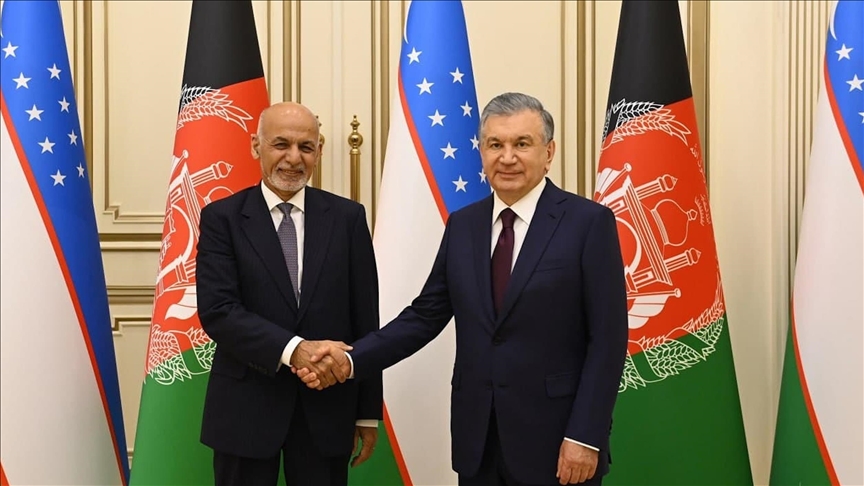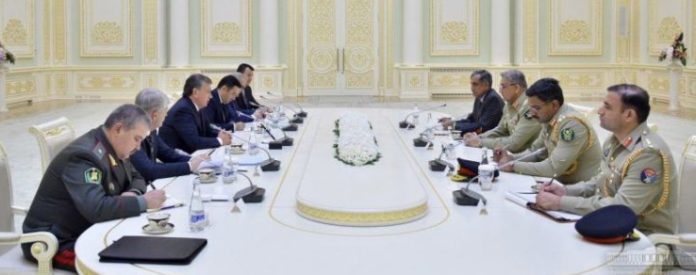The rise of Bajwa’s doctrine has become a hot topic in national, regional as well as international media. Regional security experts and international power brokers are interested to know the salient features of Bajwa’s doctrine. Most of them are seriously considered it as one of the key factors of achieving the desired goals of peace and harmony in the region.
Recently, Chief of Army Staff (COAS), General Qamar Javed Bajwa visited one of the important countries of the Central Asia i.e. the republic of Uzbekistan during which he met with the foreign minister and president as well and discussed matters of regional security and prospects of defense cooperation between the two countries. COAS was received by Uzbek Defence Minister, Major General Abdusalom Azizov and Chief of General Staff, Major General Pavel Ergashev on his arrival to Uzbekistan.
There is a paradigm shift in the foreign policy of Pakistan owing to which Central Asia has become epicenter for its peaceful pursuits of energy and food security in the region. Peace in Afghanistan has remained one of the strategic priorities of Pakistan which has now got momentum after the recently held regional peace conference on Afghanistan by the government of Uzbekistan.
US’s unrealistic mantra of “do more” has forced/ pushed the establishment of Pakistan to search for new power centers in the region. Pakistan’s emerging strategic ties with Russia and Central Asia especially, Uzbekistan, Turkmenistan, Azerbaijan, Kazakhstan and Tajikistan would open new windows of opportunity in the days to come. Now Pakistan has adopted a proactive and pragmatic approach in its foreign relations that helped the country stage a diplomatic comeback at regional and global levels. While Pakistan’s engagement with all Central Asian states has increased, cooperation with Uzbekistan took center stage. A large number of agreements on economic cooperation, trade joint ventures, scientific and cultural cooperation, education, tourism etc. were inked between them.
While meeting with General Qamar Bajwa Uzbekistan‘s President H.E. Shavkat Mirziyoyev appreciated Pakistan’s achievements in the fight against terrorism and said that the world needed to recognize Pakistan’s contributions for regional and global peace. The COAS also met Foreign Minister and Secretary of National Security Council of Uzbekistan. Both sides agreed to enhance bilateral security cooperation and continue efforts, which bring peace and stability in the region.
Uzbek Foreign Minister Abdulaziz Kamilov also met with the Chief of Army Staff (COAS) of Pakistan General Qamar Javed Bajwa in Tashkent. They both discussed the state and prospects of strengthening Uzbek–Pak cooperation in various fields, underscoring the much enhanced bilateral ties in recent years.
It was noted that high level meetings, contacts of business people and exchange programs in military and military-technical fields, as well as in cultural and humanitarian area would be important for the formation of a strategic ties between Uzbekistan and Pakistan. Both sides also appreciated the outcome of the Tashkent Conference on Afghanistan “Peace process, security cooperation and regional connectivity”, held on March 26-27, 2018 at the initiative of the President of Uzbekistan.
It was stated that settlement of the Afghan problem would bring tangible benefits to all countries of the region, including the Central Asia, while stimulating construction of railways, highways, pipelines, development of regional and trans-regional trade.
In the past, Army Staff General Qamar Bajwa had assured Uzbekistan of Pakistan’s full cooperation in all its initiatives aimed at improving regional cooperation, peace and stability. Most recently, a high ranking Uzbek delegation headed by Secretary Security under the President Lieutenant General Makhmudov Victor Vladimirovich visited Pakistan and met with COAS. The two sides discussed matters of mutual interest, including security situation in the region. The delegation appreciated Pakistan Army’s sincere efforts and sacrifices in the war against terrorism and for stability in the region. National Security Advisor (NSA) Lt. Gen (Retd) Nasser Khan Janjua said that Uzbekistan and Pakistan have wonderful cordial relations, while talking to the same delegation from Uzbekistan which also met him at his office and exchanged views on regional security and regional connectivity.

Subsequently, the NSA gave a detailed presentation to the delegation highlighting the international and regional security situation. The NSA deliberated on the significance of bilateral relationship, common challenges and opportunities for Pakistan and Central Asian Republics. Thereafter, the NSA briefed the delegation about the efforts of Pakistan to bring the stability and peace in Afghanistan stressing that peace in Afghanistan is not only peace in Pakistan but CARs and whole of the region. He also appreciated the great initiative taken by the President of Uzbekistan at Tashkent Conference which specifically focused on the peace and stability of Afghanistan.
Lt Gen Mahmudov expressed strong desire of Uzbekistan to work with Pakistan collectively for the peace of Afghanistan which was positively acknowledged by NSA. The delegates applauded Pakistan’s efforts against terrorism and for peace in Afghanistan. Both sides agreed to work together to improve their relationship in every sphere and also align efforts for sustainable peace in the region.
Greater regional connectivity, energy cooperation, integration of socio-economic ties, and food security are heavily dependent on regional peace and harmony for which Pakistan is the most important country in the rapidly emerging socio-economic, geo-political and geo-strategic scenarios. China-Pakistan Economic Corridor is a mega project which will further enhance trade and commerce between Pakistan and Central Asian Countries. Most of the Central Asian Countries have already shown keen interest to join CPEC for a win-win proposition. Russia and Pakistan are inching towards a sustainable relation which would be beneficial for both in terms of energy cooperation, military production and training, ICT, science and technology and the last but not the least, infrastructural development.
The emerging peaceful ties between South and North Korea have also widened the scope of security alliance with Central Asia especially Uzbekistan and Azerbaijan.




